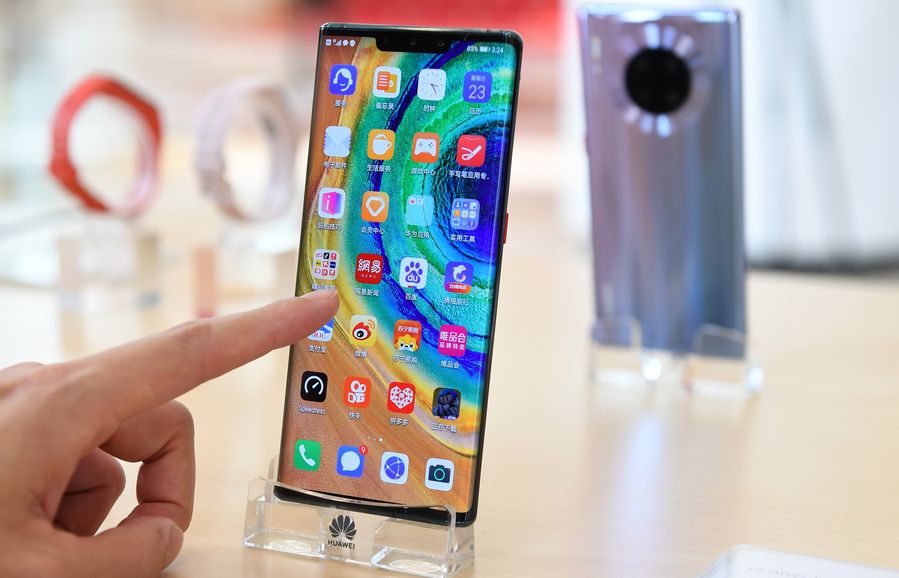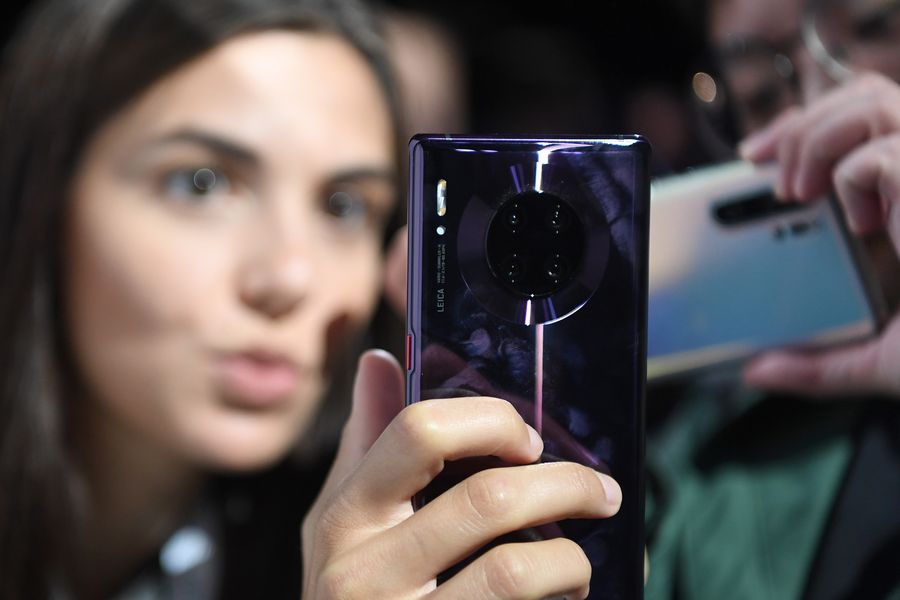
A visitor experiences Huawei's 5G Mate30 Pro at a press conference in Shenzhen, south China's Guangdong Province, Oct. 23, 2019. (Xinhua/Mao Siqian)
"Huawei will leverage our cutting-edge technologies and products to support Europe in building its own digital infrastructure and help our European partners maintain global competitiveness in industries where they have an advantage throughout the EU's digital and intelligent journey," said William Xu, Huawei's director of the Board and President of the Institute of Strategic Research.
PARIS, Nov. 5 (Xinhua) -- Chinese tech company Huawei contributed 12.8 billion euros (14.2 billion U.S. dollars) to Europe's gross domestic product (GDP) in 2018. It also sustained 169,700 jobs and generated 5.6 billion euros in tax revenues, according to an Oxford Economics study on Huawei's economic impact in Europe.
The study was presented during the annual "European Innovation Day" event organized in the French capital on Monday by Huawei.
Huawei entered the European market nearly 20 years ago. "The idea of 'In Europe, For Europe' has always guided us as we strive to integrate into and contribute to Europe. We want to use our ability to innovate to create more value for our European customers and partners," said William Xu, Huawei's director of the Board and President of the Institute of Strategic Research.
The 21st century has brought about numerous technological innovations and the information sector has developed at an incredible speed over the past 40 years. According to Xu, "however, this industry is now facing many bottlenecks."
Xu said that thanks to a broad range of leading technologies and capabilities, Huawei could play a key role in enabling the digitalization of European industry and in driving digital adoption on the continent.
"Huawei will leverage our cutting-edge technologies and products to support Europe in building its own digital infrastructure and help our European partners maintain global competitiveness in industries where they have an advantage throughout the EU's digital and intelligent journey," he said.
During the event, Josianne Cutajar, a member of the European Parliament, called for the creation of a favorable business environment in Europe, which would entail digital innovation and the reinforcement of digital sovereignty with an open and collaborative attitude. With this "fourth industrial revolution," Europe "has the opportunity to regain its leadership," she said.

A Huawei's staff member (L) introduces a Mate 30 Pro smartphone to guests after a press conference hosted by Huawei in Munich, Germany, Sept. 19, 2019. (Xinhua/Lu Yang)
The implementation of 5G technology is the first piece of evidence from the collaboration between Huawei and Europe. As of now, the Chinese firm is cooperating with several European service providers in order to roll out very high speed and low-latency 5G networks with the aim of connecting the European continent and contributing to the digital transformation of European industries.
Francois Barrault, chairman of IDATE DigiWorld, a European think tank specialized in the digital economy, media, internet and telecommunications, said that Europe is not far away from the Asia-Pacific countries and the U.S. in the 5G race.
The European Commission launched the 5G Action Plan in 2016 to boost EU efforts for the deployment of 5G infrastructure and services across the Digital Single Market by 2020, and for comprehensive coverage by 2025.
5G services are now available in nine European countries. Deployments are ongoing with tens of base stations to be lighted in many European cities, according to Barrault.
Huawei remains in the lead in the 5G domain, Xu told Xinhua. "As of now, Huawei has received more than 60 commercial contracts, of which 32 are in Europe, notably in the United Kingdom, Switzerland, Italy and Finland. As a result, Huawei's 5G technology has been well-recognized by European countries."
Regarding 6G, "in the mobile communications sector, if 2019 or 2020 is the first year for 5G, 6G should be put in place within 10 years. But what is 6G? No one currently knows," Xu said.
"So, about 6G, there remain many central and key technologies to study, and Huawei has already started to invest and launch research in this area."
Since 2013, Huawei has organized "European Innovation Day" events in Stockholm, Milan, Munich and Rome. (1 euro=1.11 U.S. dollars) ■



